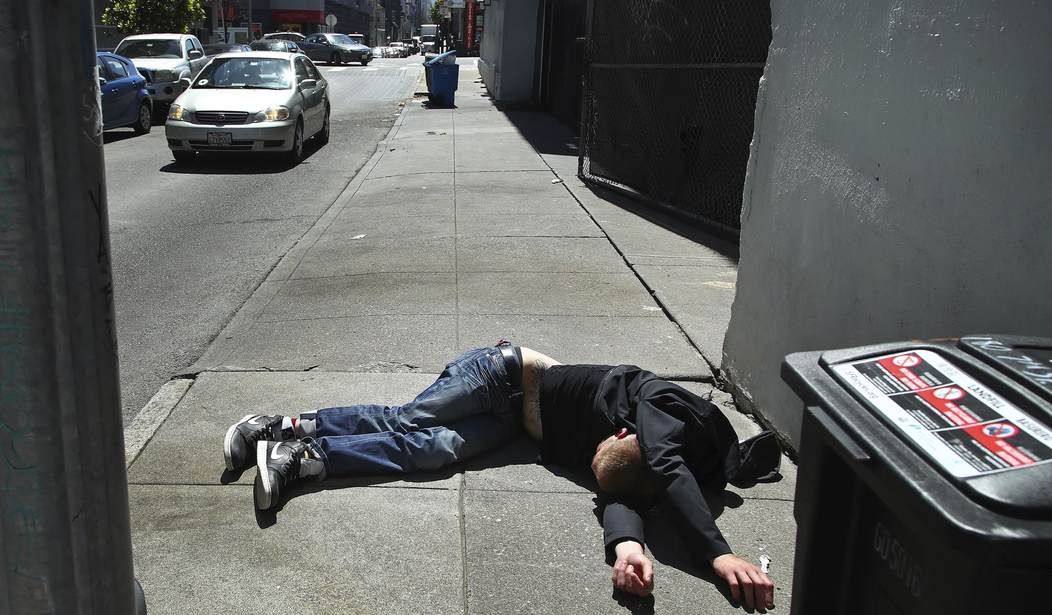Citizens of San Francisco — including Mayor London Breed — are fed up with the blight of homelessness on the city and all the problems that homelessness brings with it.
Most of all, they’re fed up with the radical homeless advocates who have made their city unlivable by filing court case after court case demanding that the city leave the homeless alone. That includes making sure the homeless have the freedom to use neighborhoods as public toilets and making city streets into untouchable campgrounds.
“The homeless coalition has held San Francisco hostage for a decade. It is time for their reign to end,” Breed said Wednesday.
The city is seeking to have a federal court lift an injunction filed by the homeless coalition to prevent the city from sweeping certain streets of homeless encampments. The Coalition on Homelessness filed the injunction against the city, claiming that the sweeps are not the right approach.
“What we are trying to do with this lawsuit is get the city to stop abusing people’s basic rights. We are trying to get them to stop illegally confiscating property and criminalizing them when they have no choice but to be on the streets,” said Jennifer Friedenbach, executive director of the Coalition on Homelessness.
The fact is that most of the homeless on the street are refusing shelter supplied by the city. A press release from San Francisco City Attorney David Chiu reported on a meeting of the minds between the homeless coalition and the city on that issue.
“It never made sense that a person who rejected a shelter offer or had a shelter bed but chose to maintain tents on the street should be considered ‘involuntarily homeless,’” reads the press release. “Plaintiffs reversed that position during oral argument today and agreed with the City that enforcement action could be taken against unhoused individuals who refuse offers of shelter.”
But the homeless coalition is adamant in trying to make the point that unless the city has a bed for each and every homeless person — whether they want it or not — San Francisco must allow the encampments.
“They have cited and arrested thousands of unhoused people whose only crime was having nowhere else to go when the city obviously did not have shelter to offer them,” Zal Shroff, interim legal director for the Lawyers Committee, told KQED in an interview before the hearing. “You can still clean the streets, you can enforce your drug laws, you can enforce your accessibility laws, clear all safety hazards, but you can’t keep policing unhoused people from block to block solely for the crime of being too poor to afford a home, when you obviously haven’t given them a place to go.”
That may only be their “only crime” because the radicals have made crimes like public indecency, public urination, loitering, and harassment unenforceable or have removed them from the criminal code.
“We are compassionate, we are supportive, we continue to help people. But this is not the way,” Breed said outside the courthouse on Wednesday. “It is not humane to let people live on our streets in tents, use drugs. We have found dead bodies, we found a dead body in these tents. We have seen people in really awful conditions and we are not standing for it anymore. The goal here is to make sure that the court of appeals understands we want a reversal of this injunction that makes it impossible for us to do our jobs.”
“It’s unfair to the people on the street and it’s unfair to the city,” San Francisco resident Fred Winograd told KQED. “Outside of my door someone can camp and stay there and not be moved because of this injunction. That’s harmful to the residents and businesses of this city, and it’s got to stop.”
All across California, cities and towns are looking for relief from the courts to the immense challenges posed by homelessness. But as long as the courts are inclined to enforce bans on homeless encampment sweeps, there’s not much cities and towns can do.










